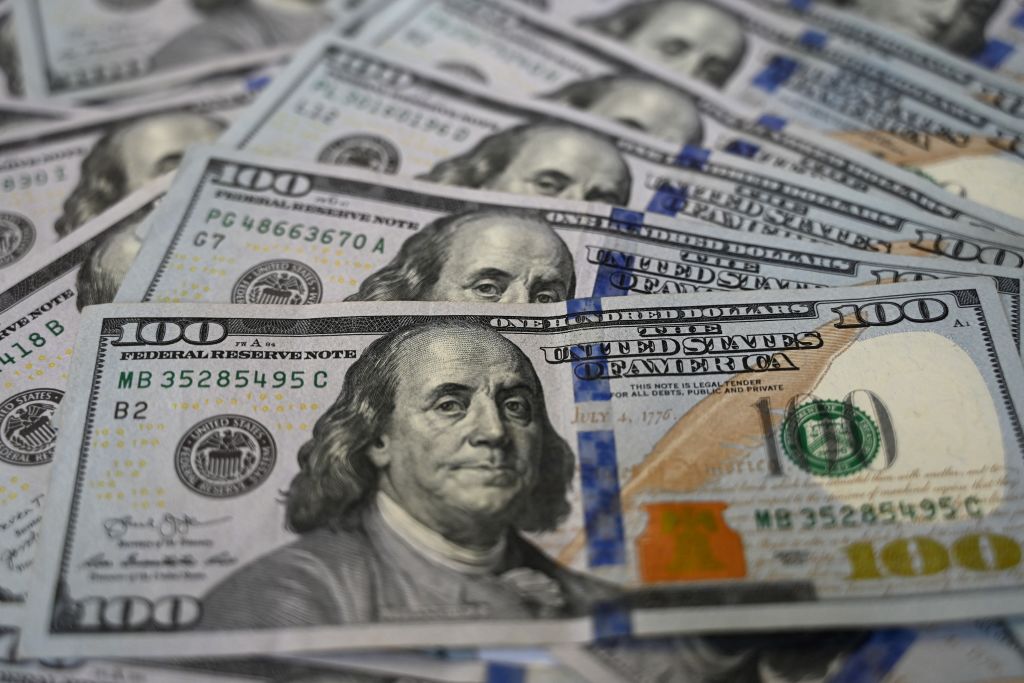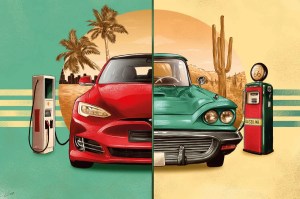Inflation is about far more than rising prices. In this excerpt adapted from Inflation: What It Is, Why It’s Bad — and How to Fix It, the book’s authors explain how the debasement of money ultimately corrupts society.
The scenario is fairly standard: central banks devalue money; prices shoot up. Governments look for ways to tamp down inflation by keeping people from spending. They also respond with price controls, capital controls, higher taxes. Governments grow larger and often impose more constraints. People lose their freedom, and worse.
In ancient Rome, the emperor Diocletian attempted to halt the empire’s rampant inflation by imposing price controls on “900 commodities, 130 different grades of labor and a number of freight rates”; in other words, just about everything. Those who violated his edict were sentenced to death.
In the 1970s, Richard Nixon responded to inflation with wage and price controls. The US today has yet to see such constraints with the return of inflation. But the Fed’s inflationary expansion of the money supply is enabling ever larger, more bloated government bureaucracy, with ever more control over private enterprise and people’s lives.
The Manhattan Institute’s James Copland has noted that, since the late 1970s, more than 200,000 new rules have been added to the US Federal Register. He also points out, “more than 300,000 federal crimes are on the books, but 98 percent of these were never voted on by Congress.” This is only the federal government, not the state governments.
The potential of this vast bureaucracy to encroach on fundamental rights was demonstrated during the pandemic when the Centers for Disease Control and Prevention issued orders prohibiting landlords from evicting tenants who had stopped paying rent. The CDC’s “eviction moratoria” had little, if anything, to do with disease or public health. Its overreach was subsequently overturned by the Supreme Court. Many questioned what an unelected health bureaucracy was doing issuing “laws” that are normally enacted by Congress.
This facilitation of government bloat and power led, in 2021, to a serious push to substantially expand IRS authority. This included calls for monitoring the personal bank accounts of individuals, which was a violation of privacy and constitutional rights.
Noted technologist and author George Gilder warns that the Fed’s “scandal of money” — its money creation via zero-percent interest rate borrowing — threatens capitalism by directing money away from growth-creating ventures and into social welfare bureaucracies. Millions of Americans whose savings and retirement accounts are being eroded by inflation are being pushed, Gilder says, into “acute dependency on government programs such as Social Security, disability, Medicaid and Medicare.” Instead of a society based on enterprise and upward mobility, the Fed’s “scandal of money,” Gilder says, is creating government dependency that is negating the American dream.
But inflation’s most damaging effect may be its debasement of social behavior. Money, after all, is more than a measuring instrument. By providing a mutually-agreed-upon, stable unit of value, money facilitates trust between buyer and seller, lender and borrower. It helps people cooperate in a market economy based on expectations that promises will be fulfilled. Money I’m borrowing from you will be the same value as the money I will use to repay you ten years from now. Stable money promotes the market equivalent of the Golden Rule: do unto others as you would have them do unto you.
When money is no longer a trustworthy measure of value, these promises aren’t kept. Market behavior and relationships between people become warped and distorted. Agreements are voided. Creditors lose their shirts. Debtors gain unexpected windfalls. Real wages decline. Pensioners find their monthly payments are inadequate. People are taxed unfairly.
Worst of all, no one knows why all of this is happening. You’re not sure why prices are rising or why your money doesn’t go as far as it once did. Meanwhile, you see certain people reaping unfair windfalls. They’re getting rich not through honest work, but from distorted capital markets or government cronyism. Inflation, thus, foments a sense of unfairness and grievance. As John Maynard Keynes himself acknowledged: “There is no subtler, no surer means of overturning the existing basis of society than to debauch the currency.”
At all levels of inflation, there is an undermining of social trust. Political divisions are inflamed. Angered by the unfairness and inequality they see around them people search for scapegoats.
The Romans in the third century blamed the Christians for the inflation caused by their own ruthless debasement of the denarius. Great Britain’s witch trials in the sixteenth and seventeenth centuries, and the French Revolution’s Reign of Terror in which 17,000 people were slaughtered, both coincided with periods of monetary chaos.
Finance, and people associated with it, are often demonized. During the Weimar hyperinflation, Germans blamed Jewish bankers. Nixon blamed “speculators” for a plunging US dollar. A few years later, he was blaming Arabs and “limits to growth.”
In the aftermath of the financial crisis, the Fed’s massive monetary “stimulus” (its expansion of the money supply via quantitative easing) helped trigger Occupy Wall Street demonstrations against “the rich” and “the 1 percent.” That unrest, in various forms, continues today.
The late Nobel Prize winner Elias Canetti, who wrote about the social malaise that followed Germany’s monetary collapse, provides an intriguing explanation for this characteristic reaction to inflation. Humiliated by the devaluation of their wealth, people retaliate by devaluing others. In his words: “Something must be treated in such a way that it becomes worth less and less, as the unit of money did during the inflation.”
If inflation hangs around long enough, and becomes severe enough, it becomes a truly vicious cycle. The economy deteriorates. The real value of tax revenues declines. People made poorer by inflation are paying less in real terms. The legitimacy of government collapses in a hyperinflation. Citizens resentful of higher taxes feel no moral imperative to pay them. Tax evasion soars. All of this just increases the pressure on government finances, leading to more money printing.
With this moral unraveling comes endless corruption. In Argentina, daily life means coping with constant disruption and turmoil. A resident writes that wage contracts can include several increases per year. There are constant labor strikes:
Getting ahead seems impossible. Every day is a battle in Argentina, from hustling between stores comparing prices, to peso-pinching, to waiting in bank lines to pay bills or collect subsidies. So, they hunker down, try to survive, and resign themselves to the truth that there is no “Argentine Dream.”
It’s no accident, he suggests, that the country has the most psychologists per capita. Corruption is rampant. With so much power concentrated in the hands of oligarchs and bureaucrats, payoffs and kickbacks are a part of doing business.
Inflation severs the link between effort and reward. Adam Fergusson writes that in Weimar Germany, “as the old virtues of thrift, honesty and hard work lost their appeal, everybody was out to get rich quickly, especially as speculation in currency or shares could palpably yield far greater rewards than labor.” Before World War One, bribery had been almost unheard of. However, by 1924,
There were few in any class of society who were not infected by, or prey to, the pervasive, soul-destroying influence of the constant erosion of capital or earnings and uncertainty about the future. From tax-evasion, food-hoarding, currency speculation, or illegal exchange transactions — all crimes against the State, each of which to a greater or lesser degree became for individuals a matter of survival — it was a short step to breaching one or other of the Ten Commandments.
Crime soars in nations with rampant inflation. Brazil, a chronic inflater, has long been bedeviled by rampant crime and by lawless police behavior. Hyperinflater Venezuela, where the annual inflation rate has been as high as 60,000 percent, has the highest crime rate of any nation in South America.
Studies have shown that inflation can have a stronger connection to crime than unemployment. Richard Rosenfeld, Curators’ professor of Criminology and Criminal Justice at the University of Missouri-St. Louis, has noted that “a key mechanism linking inflation to crime is the price of stolen goods.” He explains, “Price increases make cheap, stolen goods more attractive and therefore strengthen incentives for those who supply the underground markets with stolen goods. The reverse occurs when inflation is low.”
When we think of worst-case scenarios of extreme inflation we usually think of the fall of Rome and the Great Disorder of post-World War One Weimar Germany. Largely overlooked is the role that currency devaluations have played in just about every major societal upheaval.
Radical inflation has inflamed tensions not only in Venezuela and Argentina, but also in countries throughout the Middle East. The 2010 Tunisian street demonstrations that set off the Arab Spring protests were largely over food prices. The unrest then spilled over into Egypt, where the consumer price index had jumped to 18 percent by 2008. That led to the toppling of President Mubarak’s administration, and later, that of his successor, President Morsi. Unrest also increased in Iran, where inflation surged to an official rate of 25 percent in 2008. It has since gone far higher.
In 1989, a hyperinflation began in Russia that took the ruble from four per dollar on the black market to roughly 5,000 per dollar. In 1991, the Soviet Union splintered, and civil war erupted in Chechnya. Indonesia suffered price rises of 40 percent annually after a currency disaster in 1997, and East Timor decided to secede. In the 1980s, Yugoslavia suffered a hyperinflation that eventually led to its break-up into six countries.
What happens when you get this kind of unrest? People often turn to strongmen and dictators. In the 1790s, a hyperinflation in revolutionary France led to the eventual rise of Napoleon, who stabilized the currency by linking it to gold. In the early twentieth century, the post-World War One inflation that rolled through many European nations helped set the stage for the rise of not only Adolf Hitler but the other dictators of the interwar period: Benito Mussolini in Italy, Francisco Franco in Spain, Miklós Horthy of Hungary and Joseph Stalin in Russia.
In a candid interview before the Covid pandemic and shortly before his death, former Fed chair Paul Volcker warned of the dangers of monetary policy that aimed to create 2 percent inflation. “Once you begin aiming at 2 percent, then you hear people say, ‘Well, maybe we can give the economy a little more juice by going to 3 percent.’ Well, if that doesn’t work, we’ll go to 4 percent.” This is one reason that, he said, “inflation finally feeds upon itself when it gets going.”
By late 2021, Volcker’s prediction had come true. Inflation exceeded 6 percent. The US is not Weimar Germany, nor for that matter Argentina or Venezuela. But the low-level inflation of the past two decades has been damaging. It has resulted in a 38 percent erosion of the dollar’s purchasing power, an inflationary housing bubble that exploded into a global financial crisis, the severest recession since the Great Depression, and violent unrest not seen in decades.
Studies have shown that trust in American political institutions has plunged since the relatively stable money era of the 1990s. Politics has become more polarized than at any other time in recent memory. Street violence has erupted not only in the US but in nations around the world. Radical movements are flouting social norms and attacking the fundamental values and symbols of America’s system of democratic capitalism, including the Constitution and the Founding Fathers. Government has grown larger and more intrusive; political rhetoric darker and more pessimistic.
The rise of social media and the Covid pandemic did play a role in these events. Yet the frequent demonizing and scapegoating we hear in public discourse increasingly has the feel of a nation in the grip of an inflationary malaise. An example: the Biden administration blaming meat producers and other industries for high prices and “profiteering.”
Inflation’s debasement of US society is not just a domestic issue. By undermining the entrepreneurial dynamism that has long been the source of our nation’s strength, inflation threatens our national security. We saw this begin to play out in the 1970s. Inflation had weakened the nation’s economy and sapped its political will. The US retreated from Southeast Asia and abandoned the South Vietnamese. Cuba’s Soviet-style communism seemed poised to take over Central America. Nicaragua aligned itself with Havana and Moscow. There was a perception of America in decline. The nation’s military became neglected. Naval vessels fell into disrepair. Weakness emboldened our adversaries. Russia felt free to march into Afghanistan in December 1979. The US was unable to rescue diplomats taken hostage by Iran.
Fortunately, by the early 1980s, stagflation was extinguished. America’s strength was restored during the administration of Ronald Reagan. He was one of a select group of leaders who successfully defeated a major inflation.
This article was originally published in The Spectator’s June 2022 World edition.


















